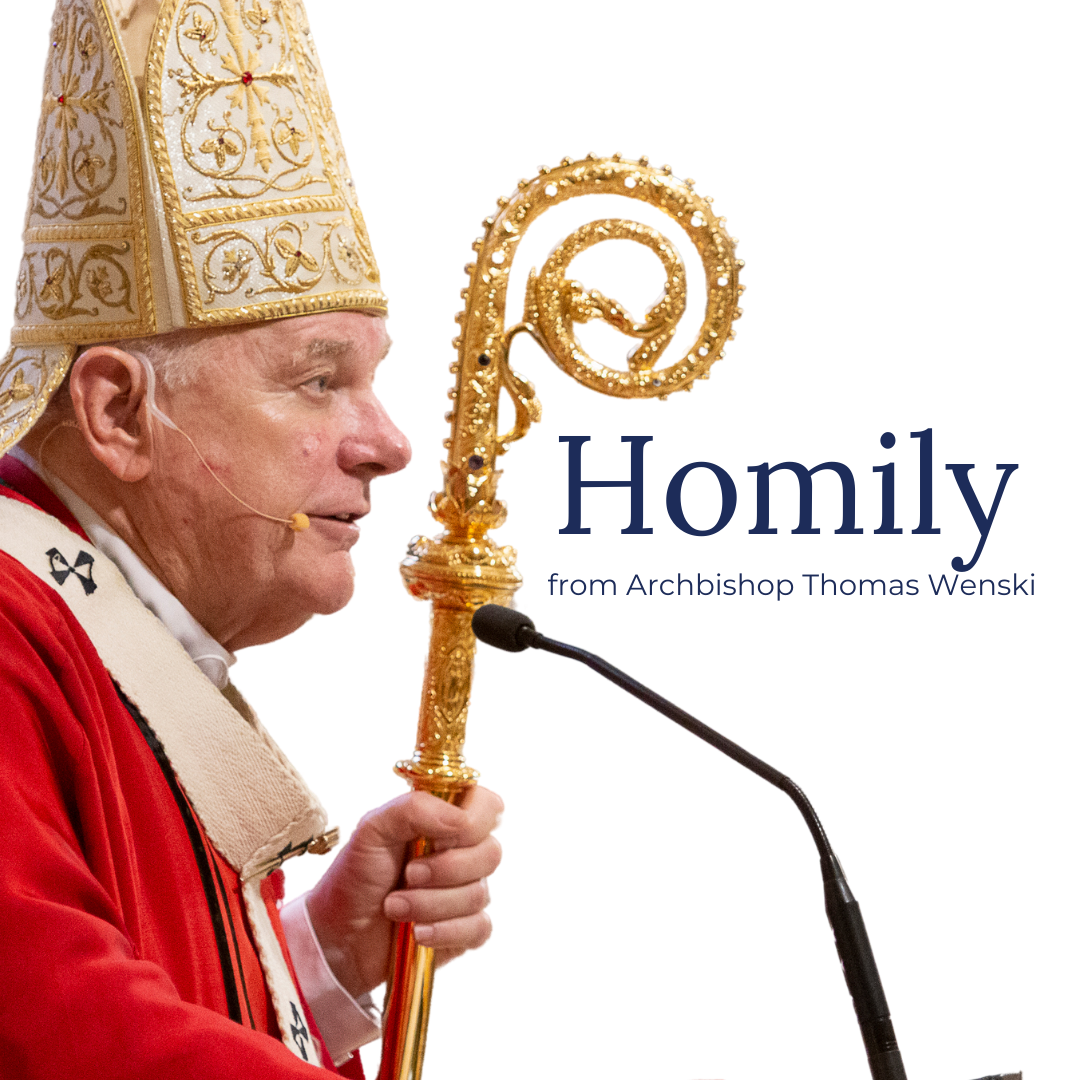By Archbishop Thomas Wenski - The Archdiocese of Miami
Homily by Archbishop Thomas Wenski at Mass at St. John Vianney Seminary in Westchester, FL with board members of the Florida Conference of Catholic Bishops. Oct, 16, 2025.
Today has been a long day – the morning the bishops met as Florida Conference of Catholic Bishops, FCCB. The FCCB among other things is our “lobbyist” in Tallahassee. We try to keep our eye on pending legislation, and we do try – with varying degrees of success – to influence political leaders and policy makers not only for the benefit of our Church’s interest but also for those who might have no voice except for ours, like the poor, the migrant, and the prisoner.
Then we had our St. John Vianney Seminary Board of Trustees Meeting. We want this College Seminary to continue to be a model of excellence in the formation of future priests for this State and beyond. So, all in a day’s work.
Now, we come to the celebration of the Mass, which is the source and summit of all that we do.
In the gospel reading, we see Jesus saying some harsh words to the Pharisees and the Scribes. He warns them that “this generation will not pass away” until the temple and Jerusalem itself are destroyed. And that’s what happened at the hands of the Romans in 70 AD.
Rather than heed Jesus’ words as a call to conversion, the scribes (the scholars of the law) and Pharisees react with hostility. They will continue to interrogate him trying to catch him in his speech so as to accuse him. For his part, Jesus will continue teaching his followers and the crowds the nature of true discipleship.
Jesus’s last rebuke of the scribes is a reminder that theological teaching at every level must not hinder but rather serve the Church’ mission of proclaiming the Kingdom of God so a to lead people to salvation.
Jesus wants all people to be saved. And those “woes” addressed to the scribes and Pharisees could be applied to many in the Church today. You can see this in many of those self-appointed guardians of the faith that are harshly critical of the bishops and the Pope because they think that we are not as condemning of those they think we should condemn. They are like the guy that was seen once standing on a street corner with sign that said: Jesus is coming – and boy, he is mad.
Those “self-appointed” defenders of orthodoxy don’t help but hinder the Church’s mission to lead people to salvation. And often times we don’t help either. Too often I have heard about that proverbial parish receptionist whose first word to someone who walks into the rectory office is “Are you registered?” instead of “How can I help you?” We will not communicate the power of the Gospel if we are joyless or sourpusses as Pope Francis said in “The Joy of the Gospel”.
Of course, it is true that he Christ that is found in the Gospels — is much different from the image of Christ that prevails in our culture today. The “popular” image of Jesus today is of a Jesus who demands nothing, who never scolds, who accepts everyone and everything — a Jesus who no longer does anything but affirm us.
Pope Benedict, when he was still Cardinal Ratzinger, said: “The Jesus that makes everything okay for everybody is a phantom, a dream, and not a real figure.” The Jesus we meet in the Gospel — who is the same yesterday, today and forever — is demanding and bold. And therefore, he is not always convenient for us in his boldness and in his demands as those scribes and Pharisees discovered.
And the Church, if she is to be the effective presence of Christ in the world today, cannot be ashamed or afraid of the very real demands of discipleship that Jesus boldly makes on those who would be his followers.
Yet, the Church is, as Pope Francis has said, a “field hospital” tending to those wounded in the battlefields of life with the healing balm of God's grace and mercy. The “medicine” of the Gospel is denied to no one.
To be sure, the core of the gospel is a call to “metanoia”, to the conversion of our minds and hearts.
And faith without the cross is not the faith of Jesus Christ, a faith without the cross is not a faith that can save. Of course, the Christ of the gospel is the answer to the longings of the human heart — the Christ that can save.
Again, we preach Christ crucified. If we present Jesus Christ as he truly is — the power of God and the wisdom of God — our people can experience him as an answer that is convincing and they can accept his message, even when it is demanding and bears the mark of the Cross.
When all is said and done, it is joy that will attract people to the gospel especially those who believe -wrongly – that our religion is a bunch of “noes”, that the Gospel — especially in its hard sayings — as something against them; and not for them.
But to be a Christian is not a burden but a gift, having encountered him is the best thing that has happened to us, and to share him with others by our gifts of our time, talent and treasure, even at the cost of our very selves, is a joy.

